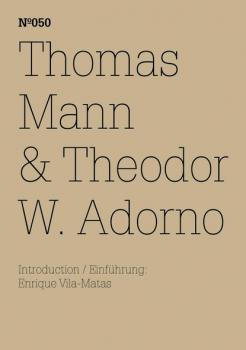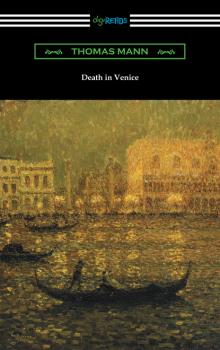ТОП просматриваемых книг сайта:
Thomas Mann
Список книг автора Thomas MannАннотация
Royal Highness takes place around the turn of the 20th century in the fictional German state of Grimmburg, which despite the efforts of Minister Trümmerhauff, Dr. Krippenreuther and Knobelsdorff is characterized by economic decline and high public debt. Agriculture is underdeveloped, mines are exhausted, the railroad is unprofitable, the university provincial. The income from the healing Ditlinden spring is limited, the castles scattered across the country lapse. The symbol of all this is a rose bush in the courtyard of the old castle, the beautiful flowers of which smell like mold. The novel is a sharp satire of a dying monarchy with a wonderful portrayal of a loveless childhood.
Аннотация
"The War and the Future" by Thomas Mann. Published by Good Press. Good Press publishes a wide range of titles that encompasses every genre. From well-known classics & literary fiction and non-fiction to forgotten−or yet undiscovered gems−of world literature, we issue the books that need to be read. Each Good Press edition has been meticulously edited and formatted to boost readability for all e-readers and devices. Our goal is to produce eBooks that are user-friendly and accessible to everyone in a high-quality digital format.
Аннотация
"Tristan" von Thomas Mann. Veröffentlicht von Good Press. Good Press ist Herausgeber einer breiten Büchervielfalt mit Titeln jeden Genres. Von bekannten Klassikern, Belletristik und Sachbüchern bis hin zu in Vergessenheit geratenen bzw. noch unentdeckten Werken der grenzüberschreitenden Literatur, bringen wir Bücher heraus, die man gelesen haben muss. Jede eBook-Ausgabe von Good Press wurde sorgfältig bearbeitet und formatiert, um das Leseerlebnis für alle eReader und Geräte zu verbessern. Unser Ziel ist es, benutzerfreundliche eBooks auf den Markt zu bringen, die für jeden in hochwertigem digitalem Format zugänglich sind.
Аннотация
Buddenbrooks is a 1901 novel by Thomas Mann, chronicling the decline of a wealthy north German merchant family over the course of four generations, incidentally portraying the manner of life and mores of the Hanseatic bourgeoisie in the years from 1835 to 1877. Mann drew deeply from the history of his own family, the Mann family of Lübeck, and their milieu. It was Mann's first novel, published when he was twenty-six years old. With the publication of the second edition in 1903, Buddenbrooks became a major literary success. Its English translation by Helen Tracy Lowe-Porter was published in 1924. The work led to a Nobel Prize in Literature for Mann in 1929; although the Nobel award generally recognises an author's body of work, the Swedish Academy's citation for Mann identified «his great novel Buddenbrooks» as the principal reason for his prize.
Аннотация
Während ihres Exils auf der Flucht vor den Nationalsozialisten entfaltete sich ein intensiver Austausch zwischen dem Schriftsteller Thomas Mann und dem vierzig Jahre jüngeren Philosophen und Musiktheoretiker Theodor W. Adorno. Die beiden hier abgedruckten Briefe von Mann an Adorno, von 1943 und 1945, stehen im Zusammenhang mit Manns Doktor Faustus. Adorno diente als sein Berater für die musikwissenschaftlichen und -theoretischen Fragestellungen, insbesondere in Bezug auf die von Arnold Schönberg begründete Zwölftonmusik, die Mann in seinem Roman verwertete – ohne allerdings deren Urheber zu erwähnen. Dies führte zum Plagiatsvorwurf seitens Schönbergs, dessen Geschichte der Romanautor Enrique Vila-Matas in seiner Einführung erzählt. Mann reagierte auf den Vorwurf mit Unverständnis, hielt er doch das von ihm in dem späteren der beiden Briefe ausführlich erläuterte Montageprinzip im Sinne einer Appropriation ohne Kenntlichmachung der Quelle, wenn auch für »vielleicht anstößig«, letztlich für zulässig. Thomas Mann (1875-1955) war Schriftsteller und Theodor W. Adorno (1903-1969) Soziologe und Philosoph. Der Schriftsteller Enrique Vila-Matas (*1948) lebt in Barcelona. Sprache: Deutsch/Englisch
Информация о книге
Автор произведения Thomas Mann
Жанр Изобразительное искусство, фотография
Серия E-Books
Аннотация
First published in 1912, “Death in Venice” is Thomas Mann’s novella concerning Gustav von Aschenbach, a famous middle-aged author who in order to alleviate a terrible case of writer’s black decides to go on holiday. Gustav first travels to the coast of Austria-Hungary but soon is overcome with the feeling that he is meant to travel to Venice. On Lido Island he takes up residence in a suite at the Grand Hotel des Bains. During dinner one evening at the hotel he sees a family at a table nearby and becomes fascinated by the beauty of their adolescent fourteen year old boy named Tadzio. His interest in Tadzio at first enlivens in him an uplifting and artistic spirit, however as the days pass his interest begins to grow into an unhealthy obsession. As the weather in Venice turns hot and humid, Gustav, feeling his health to be in decline, decides to travel to a cooler locale, however a mix up with his luggage, draws him back to the hotel and Tadzio, which he inwardly rejoices. Though Gustav never acts on his feelings regarding the boy he nevertheless feels himself drawn down a path of ruinous inward desire. A classic depiction of emotional suffering, “Death in Venice” brilliantly depicts the tragic intensity of inner psychological torment. This edition follows the translation of Martin C. Doege.
Аннотация
One of the most famous literary works of the 20th century, the novella «Death in Venice» embodies themes that preoccupied Thomas Mann (1875–1955) in much of his work; the duality of art and life, the presence of death and disintegration in the midst of existence, the connection between love and suffering, and the conflict between the artist and his inner self. Mann's handling of these concerns in this story of a middle-aged German writer, torn by his passion for a Polish youth met on holiday in Venice, resulted in a work of great psychological intensity and tragic power. It is presented here in an excellent new translation with extensive commentary on many facets of the story.
Информация о книге
Автор произведения Thomas Mann
Жанр Зарубежная классика
Серия Dover Thrift Editions










